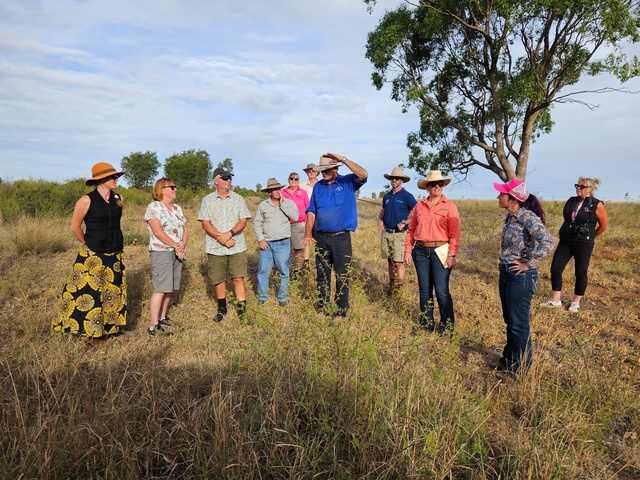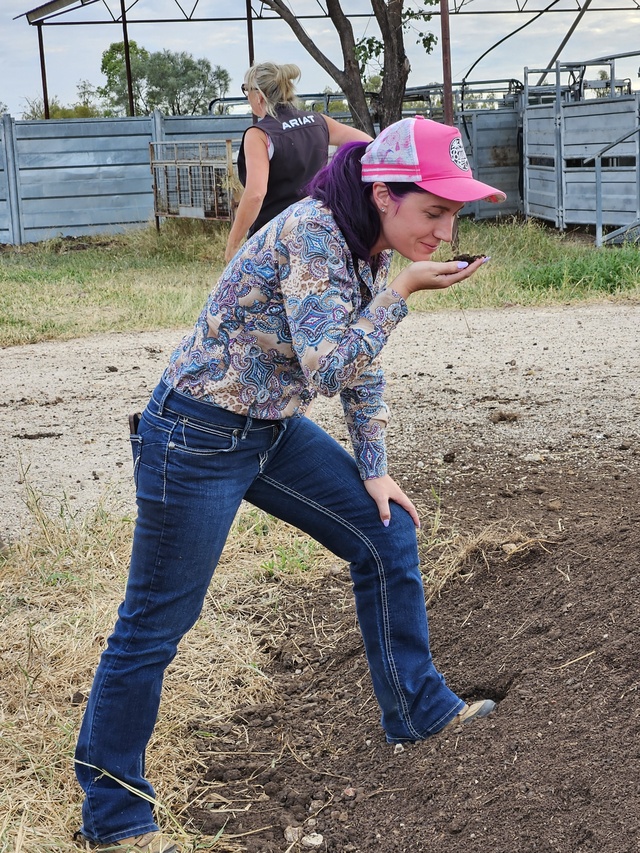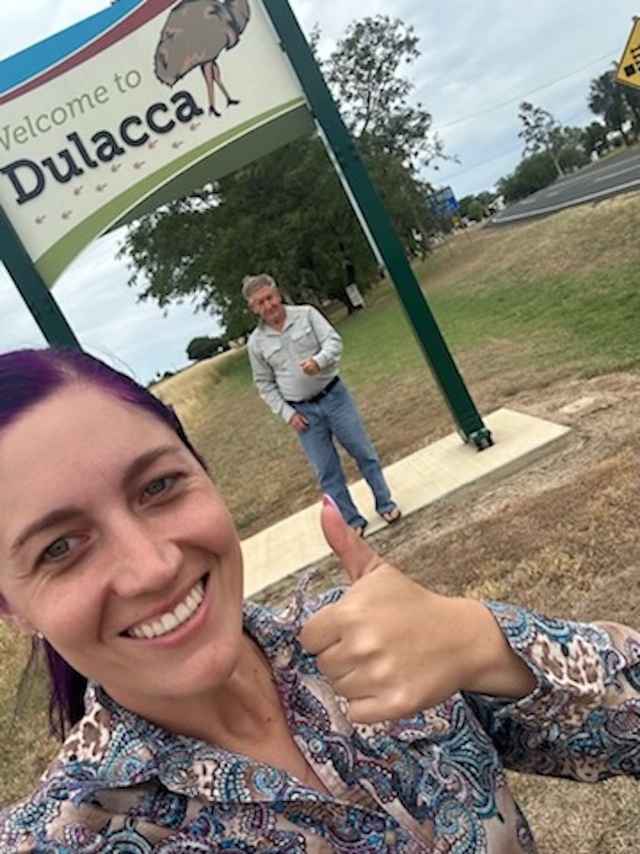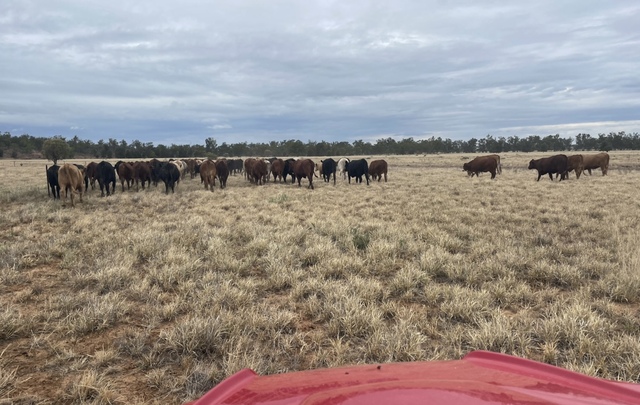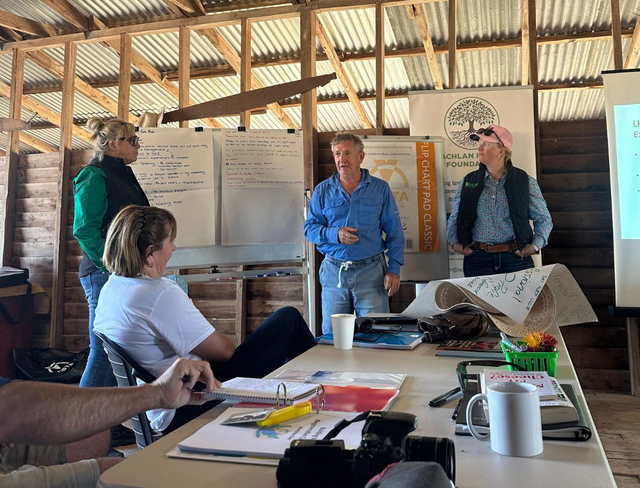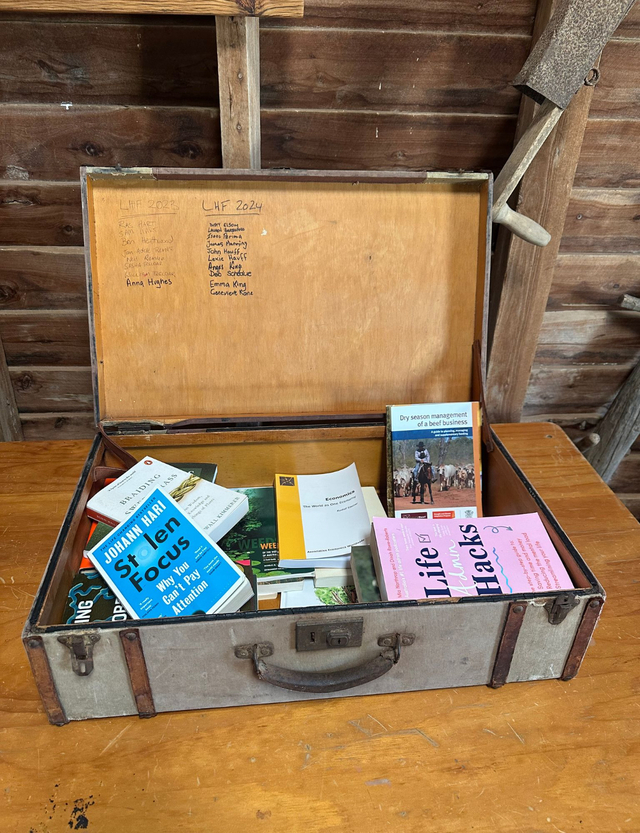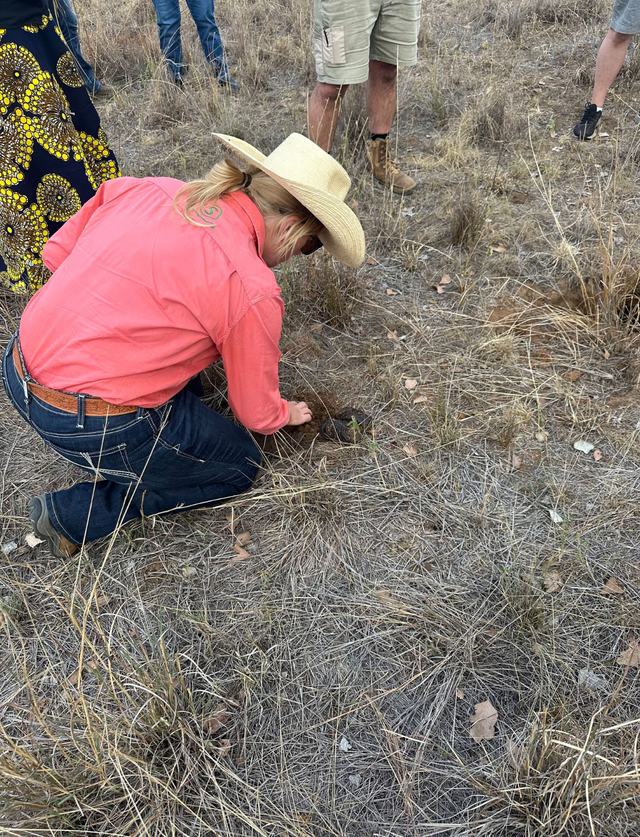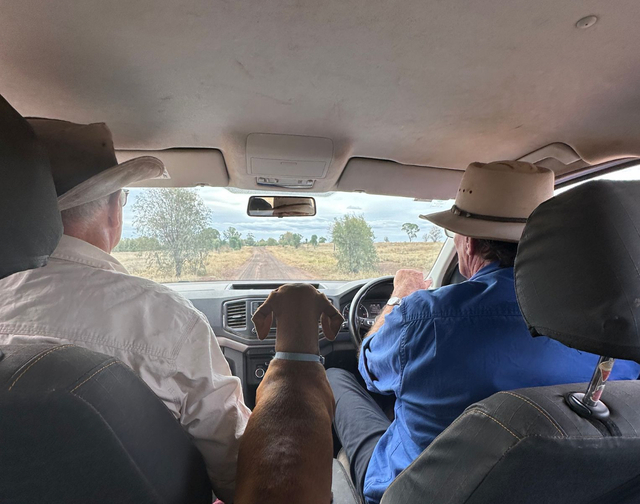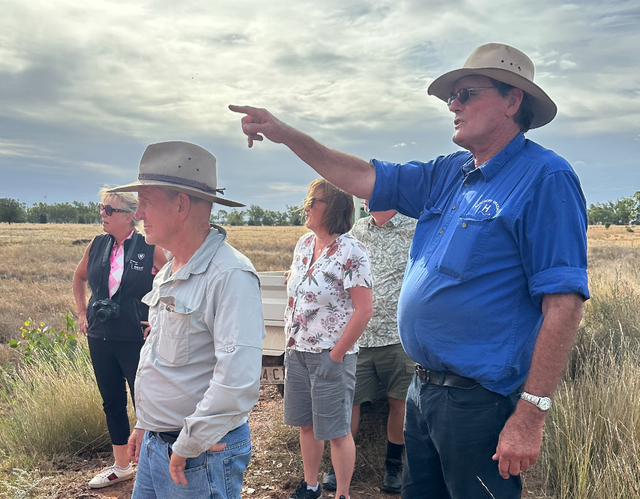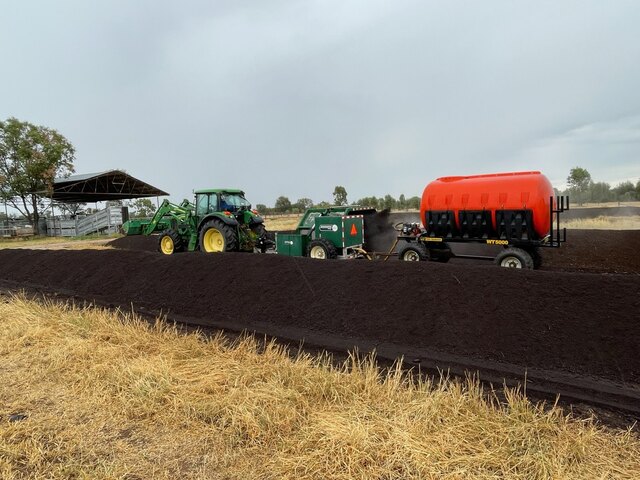Good farming techniques start with personal well-being, as Gympie father and daughter Trevor and Ashleigh Rimmington have found at their introduction to the Lachlan Hughes Foundation national scholarship. ERLE LEVEY was keen to find out more.
“It’s all part of the bigger picture: Growing ourselves so we can have better land, better food, and better futures.”
Gympie father and daughter Trevor and Ashleigh Rimmington have had a fascinating introduction to the Lachlan Hughes Foundation’s national scholarship for up-and-coming farmers.
The foundation was set up to continue the vision and work of Western Downs farmer Lachlan Hughes who was tragically lost in an on-farm accident in 2018.
He was only 36 years old, and respected as a most amazing young man.
Lachlan met Anna his wife of 10 years while studying Agribusiness at the University of Queensland, Gatton. Together they were dedicated and passionate about leading a healthy life and living and working in the rural industry.
Lachlan leaves a wonderful legacy – he had a passion for regenerative agriculture and educating young people about rebuilding our soils.
His parents Philip and Adele, Anna and their children, together with younger brother Alister and his wife Jules, are carrying on Lachlan’s dreams.
Lachlan believed that it is possible to rebuild our soils and increase their sustainable production capacity to withstand the variabilities of rainfall and that this, in turn, would revitalise our rural communities and improve the economic sustainability of the industry.
The Lachlan Hughes Foundation aims to support people who are motivated ’to do’ and are ’implementers of change’ and ’champions for regenerative agriculture.’
In 2019 a scholarship was established to fund one scholar annually to attend training courses in regenerative agriculture. It was project-based to ensure skill development, and mentoring support was provided.
A program was developed, starting in 2023, to provide training for up to 10 participants annually.
The four-module program has workshops of two and half days each, spaced throughout the year.
Participants benefit from coaching in capacity building, personal development, project design and regenerative agriculture.
Personal mentoring assists with the outcomes based, on-farm regenerative agriculture project, and includes visits to participants’ properties during the year.
The aim is to grow leaders in regenerative agricultural practices and to support them to lead change in their industry and communities.
For Ashleigh and Trevor, being selected for the nation-wide program comes just as the family is establishing a 190-acre property in Lower Wonga.
Widgee Creek runs for 1.5km around the property while Brooyar State Forestry adjoins two boundaries.
It was the perfect canvas for the family to follow Trevor’s dream: A place where nature could thrive, and where he could put into practice the benefits of sustainable living.
A cancer scare had awakened Trevor to his own mortality, and he was forced to look to the future and make plans accordingly.
Trevor could see great potential in the farm despite the fact that it was somewhat overgrown and had been farmed conventionally for many years.
“With many months of cancer treatment, multiple surgeries, radiation therapy, and immunotherapy, I had plenty of time to research the most effective ways to bring the farm back to a healthy, productive ecosystem,’’ Trevor had said.
“Regenerative farming seemed to be the best solution and minimises the use of chemicals.’’
This, together with Ashleigh’s enthusiasm and skills, impressed the Lachlan Hughes Foundation selection committee.
Based at the Hughes property at Dulacca, the first workshop in the year-long scholarship provided to 10 participants was Regenerating Ourselves Before the Land, Ashleigh said.
Simple when you think of it. Just like how you need good soil to grow good food and that in turn sets us on the path to good health.
“We’ve just returned from the first of four on-farm workshops as part of the program,’’ Ashleigh said, “and what an incredible few days it was.
“The idea behind it is something we’re really starting to resonate with: Before you can truly regenerate the land, you need to regenerate yourself.
“It sounds basic, but it’s something most of us rarely make time for.
“Over three days, we dug deep into understanding who we are – not just as farmers or business owners, but as people.
“With the guidance of our facilitator Barb Bishop, we explored the Myers-Briggs Type Indicator to better understand our personality types and how they influence our decision-making, communication, and daily operations.
“It was both confronting and empowering in the best possible way.’’
Barb Bishop also delivered sessions on communication, time management, and the importance of self-awareness.
This is especially pertinent as participants move into planning and delivering their on-farm projects later this year as part of the course.
“One quote from Barb really stuck with us,’’ Ashleigh said, “and we’ll be keeping it front and centre.
“Time is non-reusable. Time management is basically self-discipline.”
There was also a really practical session on social media, content creation, and video storytelling.
“It was all about sharing our journey in a way that educates and inspires others, especially around regenerative farming principles – which is exactly what we want to do at Lower Wonga where we are developing Highland Hideaway Experiences.’’
The Rimmingtons are breeding a mix of standard beef cattle and Highland Cattle to the farm. This is in conjunction with a getaway experience for guests to get close to other farm animals, especially the young ones.
A definite highlight of the Dulacca farm tour with Philip Hughes and daughter-in-law, Anna, was seeing how they integrate regenerative agriculture into their everyday operations was truly inspiring, Ashleigh said.
“Dulacca Downs is a beautiful example of what’s possible when you work with nature, not against it.
“They walked us through the Four Pillars of a Balanced Environment – functioning soil, hydration, nutrient cycling, and plant biodiversity – and it gave us a lot to think about in terms of what we can do back home.
“One of our biggest take-aways was understanding how our land fits into the wider catchment.
“We left with a clearer sense of how important healthy soil really is — and how energy, while invisible, is the driver of all life in a functioning landscape.’’
Dulacca Downs is a 13,000-acre cattle property and, run in conjunction with the adjacent Heatherlea property, supports about 3000 cattle.
The Hughes family employs regenerative agriculture practices, including rotational grazing across more than 60 paddocks. There are leaky weirs, level contours, spreading of humified compost made on the property, and paddock feeders that enable nutrients to improve soil health.
Environmentally sensitive areas are identified and managed separately. They utilise technologies such as AgriWebb, integrated with remote pasture sensing from Cibolabs, to monitor pasture conditions and manage grazing effectively.
Water levels and rainfall are monitored remotely, and all livestock data is analysed during their time at the properties.
At the Dulacca Downs workshop, we learned how microbials play a key role in rebuilding healthy soils by working with nature, not against it,’’ Ashleigh said.
“Seeing how the Hughes family have gradually transitioned their farm systems really inspired us to start applying some of these simple, powerful practices at our own Lower Wonga property.
“We also began to understand how to observe the environmental signs on our land – such as plant diversity, moisture retention, and insect activity – as indicators of how happy and healthy our soil and ecosystems really are.
“By learning to read these signs, we can make better-informed decisions to improve the resilience, productivity, and natural balance of our land over time.
“We’ll soon be undertaking soil testing at Highland Hideaway and are excited to learn throughout the workshops how to interpret the results and put that knowledge into practical action on the ground.’’
Ashleigh could not talk about their experience without mentioning the heart of it all: Adele Hughes, Philip’s wife.
“The warmth and generosity she brings to the program is truly something special.
“Not only did the Hughes family open their home to us, but Adele catered the entire workshop – with absolute grace, warmth, and delicious food that made us feel completely at home.
“Her hospitality is second to none. You don’t feel like a guest; you feel like family.
“There’s even a little sausage dog, Lucy, who reminded us so much of our own dog back home on the farm – it made the whole experience feel even more personal and grounding.’’
The Foundation also has a growing suitcase book library, filled with donations to support the learning journey of scholarship participants.
“That is a brilliant touch,’’ Ashleigh said. “It’s all part of the bigger picture: Growing ourselves so we can have better land, better food, and better futures.’’
Next on the calendar is for Ashleigh and Trevor to start working on their on-farm project, to be presented at the end of the program.
“One participant or couple will be awarded the Tree of Life Award – an honour we’d be incredibly proud to even be considered for.
“We’re feeling grateful, inspired, and more committed than ever to our path.
“This program isn’t just professional development – it’s personal transformation. And we’re only just getting started.’’
Ashleigh and Trevor are deeply thankful to the sponsors and donors who make the Lachlan Hughes Foundation possible.
“Their generosity is what allows Lachlan’s legacy to thrive, and we encourage others to support this powerful initiative so that his impact can continue for many years to come.’’
The program course is free to participate in and the Foundation is operated solely by donations with all directors and board members donating their time on a voluntary basis.
For Phillip Hughes, the improvement of the land and their system is a work in progress rather than a revolution.
“We run our cattle operation the same way as we live our life, and it’s reasonably sustainable. You can’t go green if you’re in the red.
“Anna and Adele are very organic in their thinking – quality, mineral-rich food is very important to us as a family.’’
As Anna puts it, “It’s a blended approach because, at the end of the day, you can’t do the regenerative work if you aren’t able to maintain your financial position.’’
What the Hughes family is doing is not just creating a living memorial to Lachlan but providing the skills to help others follow his dream for Australian farming and the land.
Australia is a big country, a dry country, and it is imperative that as much can be done as possible to regenerate the soil and hold not just it together – but the fabric of our society.

